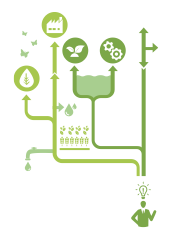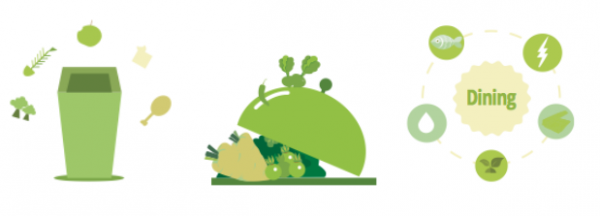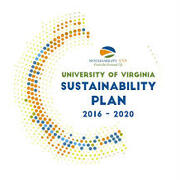On April 21st, 2016, the University of Virginia unveiled a comprehensive Sustainability Plan outlining specific short- and long-term goals for the next four years. The Sustainability Plan is based on “ideas and recommendations from over one hundred students, staff, and faculty across Grounds” and builds on the University’s many existing programs and accomplishments.
 The framework of the plan is organized around three main themes: Engage, Steward, and Discover. Each theme includes a specific set of goals and objectives to be addressed over the next four years. The “Engage” goals seek to raise community awareness and foster sustainability literacy. The “Steward” theme is divided into several different focus areas: energy and emissions, water, materials and waste, land and building use, food, and investment assets. The “Discover” goals seek to create interdisciplinary resources and foster collaboration amongst the UVA community.
The framework of the plan is organized around three main themes: Engage, Steward, and Discover. Each theme includes a specific set of goals and objectives to be addressed over the next four years. The “Engage” goals seek to raise community awareness and foster sustainability literacy. The “Steward” theme is divided into several different focus areas: energy and emissions, water, materials and waste, land and building use, food, and investment assets. The “Discover” goals seek to create interdisciplinary resources and foster collaboration amongst the UVA community.
The food goals outlined within the “Engage” theme (pages 32-38) constitute an important discussion on food and sustainability efforts at UVA. In a brief overview, the plan acknowledges the sustainability actions UVA Dining (Aramark) has embedded into their Green Dining programs, as well as the actions the Health System (Morrison’s) and Darden are beginning to incorporate into their operations. The goals include to:
- Annually increase the percentage of sustainable food and beverages available on Grounds
- Reduce food waste and single-use food serving items sent to landfill by 2030, in alignment with the overall UVA waste goals
- Reduce the energy and water impact of dining operations
- Increase student, staff, and faculty awareness of sustainable food systems and seek to translate this heightened awareness into informed choices
- Collaborate within UVA and with the region, bringing together faculty, staff, students, and dining operations to advance sustainable food systems in the broader community
- The Sustainable Food Task Force has worked diligently to create a detailed action plan to accomplish these goals and objectives. The
 Sustainable Food Task Force, launched in 2015, is comprised of representatives from three dining entities, faculty, staff, and student stakeholders.
Sustainable Food Task Force, launched in 2015, is comprised of representatives from three dining entities, faculty, staff, and student stakeholders.
During its August retreat, the Sustainable Food Task Force assembled to develop an action plan that delves further into the goals and objectives of the Sustainability Plan and to brainstorm feasible actions that can be taken to accomplish these short- and long-term goals. In its September meeting, the Sustainable Food Task Force convened to further solidify the action plan and discuss the feasibility of specific short- and long-term actions. Since then, it has been working on starting to carry out these actions. The Sustainable Food Task Force looks forward to working toward improving the University’s food sustainability over the next four years.
